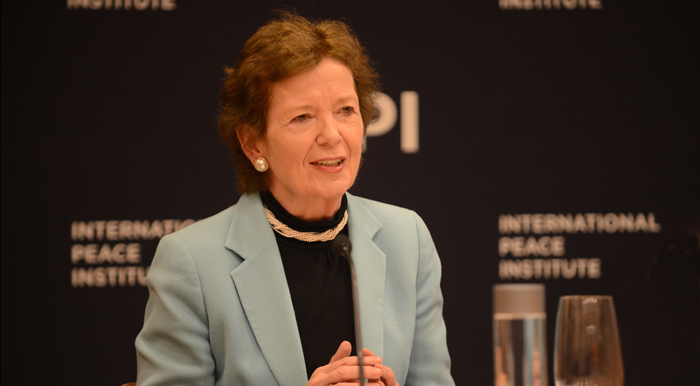
Women peace builders—on the ground and across the negotiating table—was the focus of a September 20th IPI event featuring Mary Robinson, Special Envoy of the UN Secretary-General for the Great Lakes region of Africa, where she discussed why women’s voices matter in peace processes and the next steps in implementing the February 24th Peace, Security and Cooperation Framework, also known as the Framework of Hope.
“This framework is potentially a game changer,” said Ms. Robinson, the former president of Ireland who was appointed to her current role in March of this year.
“When I got the request to serve as special envoy to the Great Lakes, I couldn’t say no,” she told the audience. She added that being the first woman appointed to the position was a kind of permission to do it differently. “And that began with actually rejecting the first mandate that I received for my job and saying, ‘no, I want that to be couched in much stronger gender/women, peace, and security terms.’”
Last May, in support of this framework, the World Bank contributed a billion dollars for projects in the Great Lakes region, “which converted it into a peace, security, cooperation, and development framework, and very much the idea of a framework of hope—that had to have a peace dividend.”
Part of how she sees the way forward is to continue to work with heads of state and governments but “also to work bottom up, to create a peace dividend.” Ms. Robinson stressed the need to involve all actors in the region. “It’s important that it’s not only governments but a wide cross-section of the population in each country—parliamentarians, women’s groups, human rights organizations, young people, business groups, trade unions, faith-based organizations, academics and others—know the details of this framework of hope,” she said. “It’s they who will benefit if the framework is implemented fully so they should be active in encouraging each of their governments to make special efforts to ensure full implementation. And they should be ready to hold their governments accountable for any failure to respond adequately.”
Youth is especially essential group in the DRC, as a staggering 50% of its population is less than 19 years old.
Ms. Robinson called the recent appointment of Russell D. Feingold, former democratic senator from Wisconsin, as the US Envoy to the region “a remarkable signal of the US commitment to need for this framework to work.” She also praised other male champions for peace, such as Desmond Tutu.
However, she spoke at length on the importance of women’s involvement in peace processes and the challenges they face, especially after almost 20 years of continual violence, in particular sexual violence.
“It’s women who are doing, and trying to change the circumstances,” she said. Ms. Robinson stressed how women’s participation has an impact not only on the peace process, but also on its outcome and on the resilience of peace. “I think women and women’s groups can help there, because women have taken the initiative,” she said.
To further that end, Ms. Robinson told the audience, she attended a meeting of women’s groups in Bujumbura in July with Femmes Africa Solidarité and others, which brought together over 150 women, more than 10 from each of the core countries, and others to support the process. The meeting was one step towards Ms. Robinson’s larger goals to develop a regional plan of action under UN Resolution 1325, and to help women’s groups “become knowledgeable about and support the framework of hope and be able to input into the processes of the framework of hope.”
Miss Robinson closed the event with a Seamus Heaney poem which is cited in the Framework of Hope. She lamented the death of her friend and countryman before reciting the stanza: “History says don’t hope / On this side of the grave. / But then, once in a lifetime / The longed for tidal wave / Of justice can rise up / And hope and history rhyme.”
IPI Meeting Brief_Mary Robinson.pdf
Watch event:







